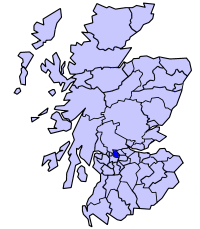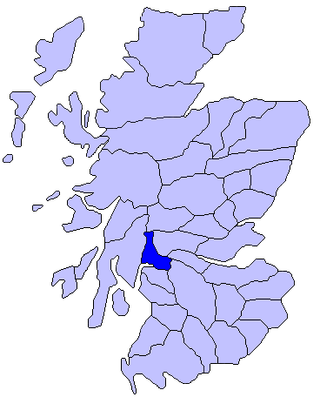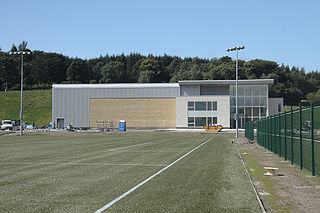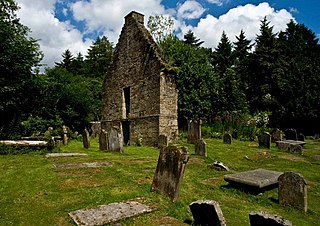
East Dunbartonshire is one of the 32 council areas of Scotland. It borders Glasgow City Council Area to the south, North Lanarkshire to the east, Stirling to the north, and West Dunbartonshire to the west. East Dunbartonshire contains many of the affluent areas north of Glasgow, including Bearsden, Milngavie, Milton of Campsie, Balmore, and Torrance, as well as many of Glasgow's commuter towns and villages. The council area covers parts of the historic counties of Dunbartonshire, Lanarkshire, and Stirlingshire.

Stirlingshire or the County of Stirling is a historic county and registration county of Scotland. Its county town is Stirling.

Strathkelvin is the strath (valley) of the River Kelvin in west central Scotland, lying north-east of Glasgow. The name Strathkelvin was used between 1975 and 1996 for one of nineteen local government districts in the Strathclyde region.

The Campsie Fells are a range of hills in central Scotland, stretching east to west from Denny Muir to Dumgoyne in Stirlingshire and overlooking Strathkelvin to the south. The southern extent of the range falls within East Dunbartonshire. The range overlooks the villages of Strathblane, Blanefield, Milton of Campsie, Lennoxtown and Torrance to the south; Killearn to the west, and Fintry and Strathendrick to the north. The Fintry Hills lie further to the north; Kilpatrick Hills lie to the west and the Kilsyth Hills to the east.

Cumbernauld, Kilsyth and Kirkintilloch East is a constituency of the House of Commons of the Parliament of the United Kingdom. It was created for the 2005 general election, replacing Cumbernauld and Kilsyth and part of Strathkelvin and Bearsden.

The Lennox is a region of Scotland centred on The Vale of Leven, including its great loch: Loch Lomond.

Strathkelvin and Bearsden is a constituency of the Scottish Parliament (Holyrood). It elects one Member of the Scottish Parliament (MSP) by the first past the post method of election. Also, however, it is one of ten constituencies in the West Scotland electoral region, which elects seven additional members, in addition to ten constituency MSPs, to produce a form of proportional representation for the region as a whole.
Campsie is a civil parish in East Dunbartonshire, Scotland. The parish was formerly part of Stirlingshire.

Lennoxtown Training Centre is Celtic F.C.'s training centre, located at Lennoxtown, East Dunbartonshire in Scotland. The complex houses the club's training and educational facilities.

The Kilpatrick Hills are a range of hills in central Scotland, stretching from Dumbarton in the west to Strathblane in the east.

Clachan of Campsie or Campsie Glen is a settlement in the East Dunbartonshire area of Scotland. It was formerly part of the county of Stirlingshire. It is situated to the south of the Campsie Fells at the foot of Campsie Glen where the Finglen and Aldessan Burns meet, forming the Glazert Water which then flows south-east until it joins the River Kelvin near Kirkintilloch.

Lennox Castle is an abandoned castle in Lennoxtown, East Dunbartonshire, Scotland, approximately 12 miles north of Glasgow. It is infamous for previously hosting Lennox Castle Hospital, Scotland's "largest institution for people with learning disabilities".

Ballikinrain is an independent residential school in Stirling, central Scotland. It is run by CrossReach, a social care outreach arm of the Church of Scotland. The school is housed in the 19th-century Ballikinrain Castle, situated in the Parish of Killearn, 2 kilometres (1.2 mi) south-east of Balfron and 5 kilometres (3.1 mi) west of Fintry.

The Glazert Water is a tributary of the River Kelvin in East Dunbartonshire, Scotland. It is formed 1 kilometre south of Clachan of Campsie (55.9804°N 4.2215°W) at the junction of the Finglen Burn and the Aldessan Burn, which both descend from the Campsie Fells. The Glazert Water runs southeast for 6.5 kilometres (4 mi), flowing past both Lennoxtown and Milton of Campsie on the way, before finally joining with the much smaller River Kelvin 1 km north of Kirkintilloch (55.9467°N 4.1531°W).
Glorat House is a 19th-century mansion house in East Dunbartonshire, Scotland. It is located in Milton of Campsie, in the former county of Stirlingshire. The house is a category B listed building.
Glorat is a place and estate in the parish of Campsie in East Dunbartonshire, Scotland.

Torrance railway station was opened in 1879 on the Kelvin Valley Railway and served the area of the village of Torrance in East Dunbartonshire until 1951 for passengers and 1959 for freight.
The Finglen Burn is a burn in Scotland that runs from north east of the Earl's Seat to just north of Campsie Village where it merges with the Kirk Burn to form the Glazert Water. Named tributaries of the burn from the earliest to the latest are as follows: Cooper's Gote, Flaughter Burn, Earl's Burn, Altmarrage Burn, Almarnock Burn, Horse Burn, Almeel Burn and finally the Pow Burn.

Bishopbriggs North and Campsie is one of the seven wards used to elect members of the East Dunbartonshire Council. It elects four Councillors.















